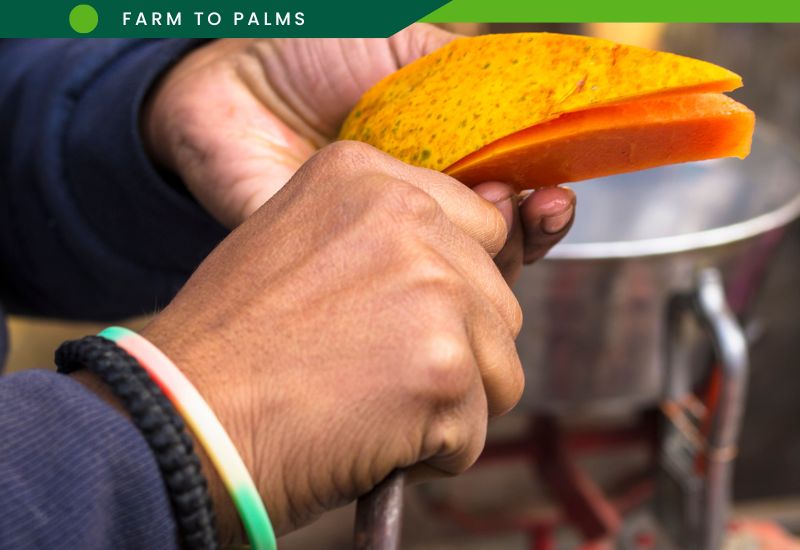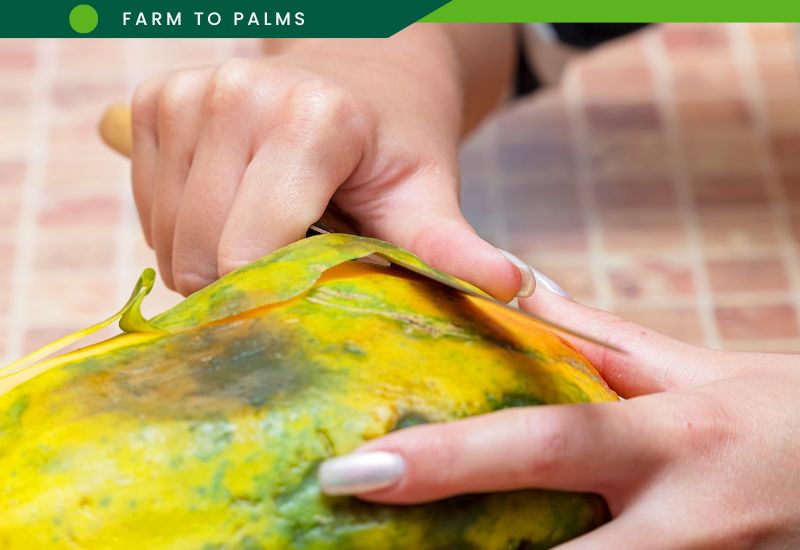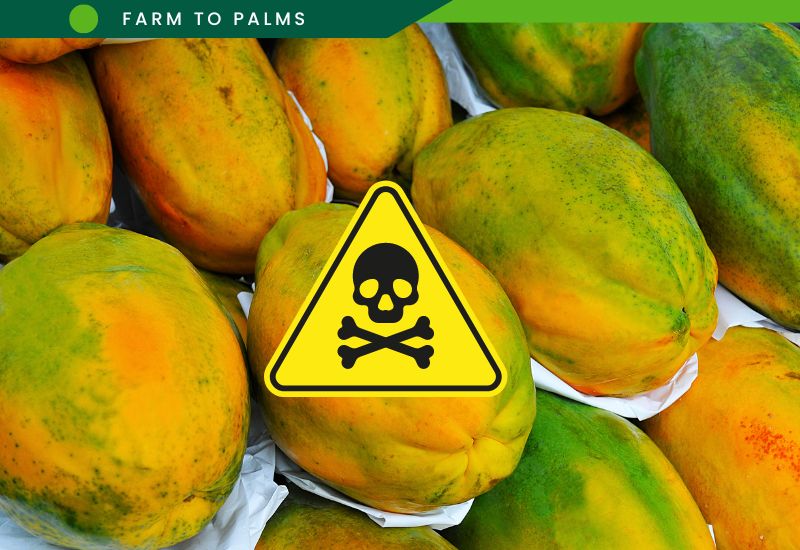The flesh of papaya is widely enjoyed for its nutritional value, while the skin is unsuitable for consumption and is generally not recommended.
Papaya skin contains certain compounds and substances that may be less palatable and potentially harmful to ingest.
Papaya, a tropical fruit known for its sweet and delicious flavour, has long been a staple in many diets. However, a new trend is emerging: exploring the potential health benefits of consuming papaya skin.
This novel approach to papaya consumption piques the interest of health-conscious individuals and nutrition enthusiasts worldwide.
The question of whether it’s healthy to eat papaya skin is not a simple one. It requires a nuanced understanding, as both potential benefits and risks are associated with consuming papaya skin.
In this article, Farm to Palms will delve into the potential health benefits and risks of eating papaya skin and provide tips for preparing and consuming it safely.
The potential health benefits of papaya skin
Rich in antioxidants

Papaya skin is packed with antioxidants, which help protect your body from harmful free radicals. Free radicals are unstable molecules that can damage your cells and contribute to the development of chronic diseases like cancer, heart disease, and Alzheimer’s disease.
High fibre
Papaya skin is also rich in dietary fibre, essential for maintaining healthy digestion and preventing constipation. A diet high in fibre has also been linked to a reduced risk of chronic diseases like diabetes, heart disease, and certain types of cancer.
Contains papain

Papain contains an enzyme found in the flesh and skin of the papaya fruit. This enzyme is known for its digestive properties and is often used in supplements and digestive aids to help break down proteins and improve digestion.
It may have anti-inflammatory properties
Some studies have suggested that papaya skin may have anti-inflammatory properties, which could help to reduce inflammation throughout the body and prevent chronic diseases like arthritis.
Some reasons why eating papaya skin is not recommended
Bitter Taste:

Papaya skin has a bitter taste and rugged texture, making it unappealing to eat raw. The bitter flavour is due to alkaloids and other compounds that develop in the skin as the fruit ripens.
Pesticide Residues:

Like many fruits and vegetables, papayas may be treated with pesticides to control pests and diseases. Pesticides can build up on the outer layer of fruits, such as the skin.
Eating papaya skin might heighten your intake of pesticide remnants, potentially leading to health hazards if consumed excessively.
Potential Irritants:

Papaya skin contains latex, a natural substance in certain plants, including papaya trees. Latex can cause skin irritation, allergic reactions, or digestive discomfort in specific individuals, particularly those who are sensitive or allergic to it.
Digestive Issues:

The rugged and fibrous texture of papaya skin can make it difficult for the digestive system to break down, and if consumed in large quantities, it may cause gastrointestinal discomfort or indigestion. Additionally, certain compounds in papaya skin may have laxative effects, potentially leading to diarrhoea or stomach upset.
Food Safety Concerns:

Papaya skin may harbour bacteria, dirt, or contaminants from handling and transportation, increasing the risk of foodborne illness if consumed. Thoroughly washing the exterior of the papaya before cutting and consuming the flesh can help reduce the risk of contamination.
Some tips for preparing and consuming papaya skin

So, should you eat papaya skin? If you want to explore the potential health benefits of consuming papaya skin, you can do a few things to minimize your risk of adverse side effects.
Choose organic papayas

If possible, choose organic papayas that have not been treated with pesticides. This will minimize your exposure to harmful toxins.
Wash your papaya
Before consuming papaya skin, wash it thoroughly to remove dirt, bacteria, or pesticides.
Start small
If you are new to eating papaya skin, start with a small amount and gradually increase your intake over time. This will give your body time to adjust to the latest food and minimize the risk of digestive issues.
Be mindful of allergies
Avoid consuming papaya skin altogether if you have a known allergy to papaya or other tropical fruits.
Conclusion:
In summary, While papaya flesh is nutritious and a popular choice in a healthy diet, avoiding the skin is advisable. Papaya skin tastes bitter and may harbour pesticide residues, latex, and potential irritants.
Eating it could lead to digestive problems or food safety risks. To enjoy the health benefits of papaya, focus on consuming the ripe flesh of the fruit while discarding the skin.
Additionally, always wash the exterior of the papaya thoroughly before cutting into it to minimize the risk of contamination from external sources.
If you have concerns about food allergies, sensitivities, or digestive issues, consult a healthcare professional for personalised advice and guidance.

